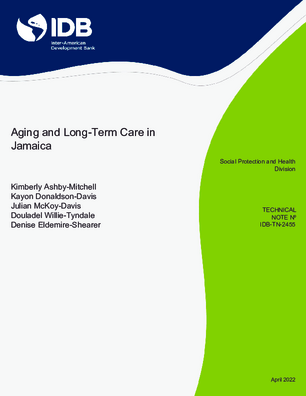Mona Ageing and Wellness Centre
MAWC is a specialized centre in The Office of the Principal of The University of the West Indies, Mona Campus. MAWC’s work is focused in four (4) priority areas: Research, Training, Outreach and Policy Influence. Our mission is to improve the health and wellbeing of the older adult population nationally and regionally through novel ageing research, training in geriatrics and gerontology, contribution to policy development, and community outreach.
Abstract: Recent estimates show that almost 15% of the Jamaican population is 60 years old or more. About 7% of this population need help with at least one activity of daily living. The demand for long-term care services is expected to rise as the country’s population grows older. In a context in which family sizes are shrinking and older adults are experiencing poor health and critical socioeconomic vulnerability, the means to meet care needs privately either by relying on unpaid care, provided by their families or close networks, or by purchasing services in the market are scarce.
The regulation and provision of long-term care services in the country is highly fragmented and focuses mostly on those that are economically and socially vulnerable, as part of poverty-relief programs. Residential care is the main long-term care service available in Jamaica. Public institutions target the poor, while the private sector also offers various levels of institutional care, from residential to nursing care. The nongovernmental sector is also heavily involved in the provision of residential care in Jamaica, especially through churches. All things considered, women in the family are still the main providers of care. The main conclusion of the report is that long-term care in Jamaica is still an unmet need that requires the development of comprehensive policies and programs.
Research Link: https://publications.iadb.org/en/aging-and-long-term-care-jamaicaFunded by IDB
Overview: Older persons 60 years and over in Jamaica were studied using quantitative, qualitative and clinical tools. The sample of two thousand nine hundred and forty three (2,943) persons was drawn from the south eastern parishes of Kingston & St. Andrew (KSA), St. Catherine and St. Thomas. The 2011 National census and other local health and social policies and studies provided additional information. The findings were compared to the 1989 Elder Study by D. Eldemire-Shearer, the 1995 Survey of Living Conditions (SLC) special ageing module, the 2010 SLC and the Social and Economic Survey (2010). The main aims of the study were 1) to assess the health and social status of older persons in Jamaica and 2) to identify the needs of this population.
Research Link: https://www.mona.uwi.edu/commhealth/sites/default/files/commhealth/uploads/EXECUTIVE%20SUMMARY.pdfFunded by National Health Fund (NHF)
Abstract
Objective: To determine the prevalence of dementia and dementia types in Jamaica.
Methods: An embedded case-control design was used to investigate dementia within the ageing population. Cases (Mini-Mental State Examination [MMSE] scores of ≤ 20) and controls (MMSE scores of > 20) were evaluated using DSM-IV protocol and magnetic resonance imaging. Prevalences (crude and age-adjusted) were calculated and distribution of dementia by type described.
Results: Dementia prevalence was 5.9%. Alzheimer’s pattern dementia accounted for 61.8% and vascular dementia 32.4%. However, vascular disease was prominent in 45.5% of the Alzheimer’s cases. Female gender and increasing age were associated with higher rates of dementia. Dementia was 38 times more likely in participants with MMSE scores below 20.
Conclusion: This first nationally representative study indicated that dementia rates in Jamaica were comparable with regional and global estimates. Regardless of the dementia type, vascular change was pervasive and suggested that synergistic efforts should be made to address underlying contributory factors. Cardiovascular and cerebrovascular risk reduction should be deliberately pursued as integral adjuncts to dementia risk reduction.
Research Link: https://www.mona.uwi.edu/fms/wimj/system/files/article_pdfs/wimj-iss1-2018_1_8.pdfFunded by National Health Fund (NHF)


